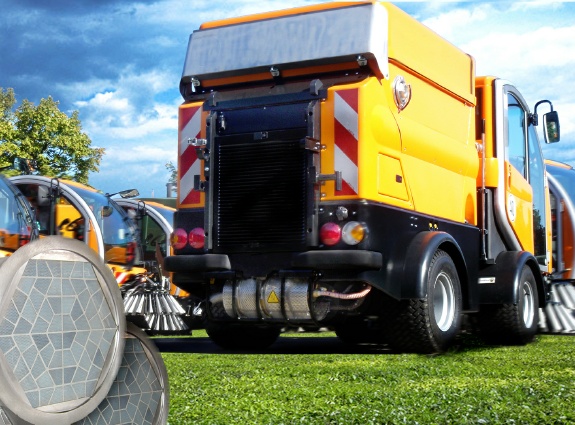Modern diesel cars are quieter than their predecessors but also release considerably fewer exhaust fumes into the atmosphere.
But the real culprit in diesel are heavy-duty, construction and off-road vehicles - they're often special vehicles made in small batches and each requires a different filter geometry. The filters for are not yet state-of-the-art. A new diesel particulate filter technology will soon teach even these vehicles to give up smoking.
Conventional diesel soot filters usually consist of cylindrical ceramic blocks crisscrossed by numerous channels. A block of this kind cannot be made in one piece. Instead, individual quadratic honeycomb segments are bonded together to form a large block. The bonds act as expansion joints that offset the temperature stresses during operation. This is vital, for a solid ceramic block would break apart.

The drawback of these square honeycombs is that the angular bonded block has to be ground into a cylindrical shape at the end of production, thus wasting valuable material. What is more, this smooth finishing takes time and requires expensive machinery.
Together with filter manufacturer CleanDieselCeramics CDC and sponsored by Saxony’s economics ministry, developers at the Fraunhofer Institute for Ceramic Technologies and Systems IKTS in Dresden have developed a honeycomb structure with a different geometry. Rather than being rectangular, it takes an irregular four-cornered shape. This allows a wide variety of filter geometries to be created – even close-to-cylindrical ones. Grinding is no longer necessary.
An added advantage of this development is the altered geometry of the channels. Usually, the gas flows into the filter through four-sided channels. The Dresden researchers have opted for a smaller, triangular cross-section. This enlarges the filter surface in the tiny channels. The triangular shape is also more stable, and the filter is less sensitive to lateral pressure.
The partners in this venture have tested and optimized the production method on a pilot production line at the IKTS – and also tested the third innovation, a silicon carbide ceramic developed at the IKTS. The advantage of this latter innovation is that the researchers can easily and precisely adjust the size of the pores for optimum filtration of the soot particles.
“As far as the performance and quality of our new development is concerned, we can hold our own against anything on the market,” says IKTS project manager Jörg Adler. The up-and-coming firm CDC is currently building its first plant near Dresden. From spring of this year, about 40,000 filters will be produced there annually and installed in construction machinery as an upgrade kit.





Comments